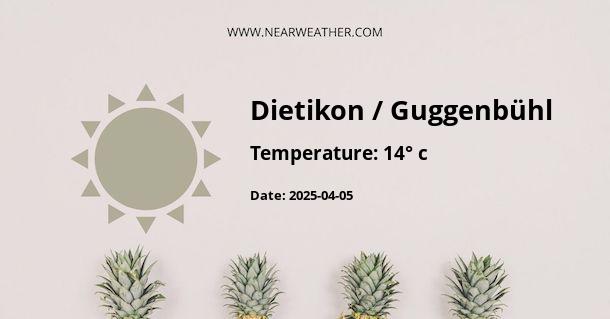Climate and Weather in Dietikon / Guggenbuehl, Switzerland
Dietikon / Guggenbuehl, located in the canton of Zurich in Switzerland, experiences a temperate climate with four distinct seasons. The weather in this region is influenced by its proximity to the Alps, which can lead to varying weather patterns throughout the year. Understanding the climate and weather patterns in Dietikon / Guggenbuehl is essential for residents and visitors alike to prepare for the conditions they may encounter.
Annual Weather Overview
To understand the climate and weather in Dietikon / Guggenbuehl, it is important to look at the annual weather patterns. The table below provides an overview of the average temperatures and precipitation throughout the year:
| Month | Average Temperature (°C) | Precipitation (mm) |
|---|---|---|
| January | -1 | 58 |
| February | 0 | 51 |
| March | 3 | 64 |
| April | 7 | 82 |
| May | 12 | 119 |
| June | 16 | 142 |
| July | 18 | 146 |
| August | 18 | 148 |
| September | 14 | 111 |
| October | 10 | 92 |
| November | 4 | 74 |
| December | 0 | 66 |
From the table, it can be observed that Dietikon / Guggenbuehl experiences a range of temperatures throughout the year, with the warmest month being July and the coldest month being January. Additionally, there is variation in precipitation, with the highest average precipitation occurring in July and August.
Seasonal Weather Patterns
The climate in Dietikon / Guggenbuehl can be further understood by looking at the seasonal weather patterns:
Spring (March to May)
Spring in Dietikon / Guggenbuehl brings milder temperatures and an increase in precipitation. The average temperature gradually rises from March to May, with spring being a relatively wet season due to increased rainfall.
Summer (June to August)
Summer is the warmest season in Dietikon / Guggenbuehl, with July and August experiencing the highest temperatures. The region enjoys longer daylight hours and lower precipitation during this season, making it ideal for outdoor activities.
Fall (September to November)
During fall, temperatures gradually decrease, and the region experiences colorful foliage as the leaves change. There is a moderate level of precipitation in the early fall months, making it a transitional period from the warmer summer to the colder winter.
Winter (December to February)
Winter in Dietikon / Guggenbuehl brings cold temperatures and occasional snowfall. January, the coldest month, sees temperatures dropping below freezing, and the region experiences the highest amount of snowfall during this season.
Extreme Weather Events
While Dietikon / Guggenbuehl generally experiences mild weather, it is not immune to extreme weather events. The region can occasionally experience heavy snowstorms in winter and thunderstorms with intense rainfall in summer. These events can impact transportation, outdoor activities, and overall safety, requiring residents and visitors to stay informed and prepared for such occurrences.
Conclusion
Understanding the climate and weather patterns in Dietikon / Guggenbuehl is essential for residents, businesses, and tourists. With its varied seasonal weather and potential for extreme events, being prepared and informed about the climate can enhance safety and the overall experience of living in or visiting this beautiful region of Switzerland.
A - Dietikon / Guggenbühl's Latitude is 47.400089 & Longitude is 8.408180.
A - Weather in Dietikon / Guggenbühl is 10° today.
A - Climate Conditions in Dietikon / Guggenbühl shows overcast clouds today.
A - Humidity in Dietikon / Guggenbühl is 90% today.
A - Wind speed in Dietikon / Guggenbühl is 5.54 km/h, flowing at 40° wind direction. today.
